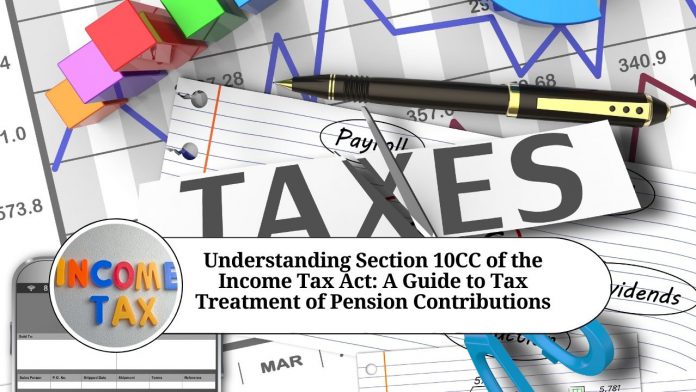Section 10CC of the Income Tax Act: Understanding the Provisions
The Indian Income Tax Act lays down various provisions for calculating and paying taxes. One such provision is Section 10CC of the Income Tax Act. This section deals with the tax treatment of income received by an employee in the form of a contribution from an employer to a notified pension scheme. Let’s take a closer look at this section and understand its provisions.
Introduction
Section 10CC of the Income Tax Act, 1961 was introduced in the year 2003. This section deals with the tax treatment of the contribution made by the employer to a pension scheme notified by the Central Government. The section provides relief to employees who receive contributions from their employers for their retirement.
Provisions of Section 10CC
- Notified Pension Scheme
Section 10CC applies to an employee’s contribution to a pension scheme notified by the Central Government. The scheme can be either a statutory or a non-statutory scheme.
- Contribution Limits
The employer’s contribution to the pension scheme is tax-free up to 10% of the employee’s salary in the previous year. The employee’s contribution, however, does not have any such limit.
- Withdrawal Conditions
The employee is allowed to withdraw the accumulated balance in the pension scheme only on retirement or on reaching the age of 58 years. In case the employee withdraws the accumulated balance before the specified time, the amount will be taxable in the year of withdrawal.
- Tax Treatment
The employer’s contribution to the pension scheme is not included in the employee’s taxable income. However, the employee’s contribution to the scheme is included in their taxable income. The tax treatment of the accumulated balance in the pension scheme is also based on the tax treatment of the employer’s and employee’s contributions.
- Exemption
Section 10CC provides an exemption for the employer’s contribution to the pension scheme up to 10% of the employee’s salary. The exemption is available even if the employee has not made any contribution to the scheme.
Conclusion
Section 10CC of the Income Tax Act, 1961 provides a tax relief to employees who contribute to a notified pension scheme. The section provides an exemption for the employer’s contribution up to 10% of the employee’s salary. However, the employee’s contribution to the scheme is included in their taxable income. It is important for employees to understand the provisions of Section 10CC and take advantage of the tax benefits provided.
Other Related Blogs: Section 144B Income Tax Act
Frequently Asked Questions (FAQs)
Q: What is Section 10CC of the Income Tax Act? A: Section 10CC of the Income Tax Act provides tax relief to employees who receive contributions from their employers for their retirement. It deals with the tax treatment of the contribution made by the employer to a pension scheme notified by the Central Government.
Q: What is a notified pension scheme? A: A notified pension scheme is a pension scheme that is approved and notified by the Central Government.
Q: Is there any limit on the employer’s contribution to the pension scheme? A: Yes, the employer’s contribution to the pension scheme is tax-free up to 10% of the employee’s salary in the previous year.
Q: Is there any limit on the employee’s contribution to the pension scheme? A: No, there is no limit on the employee’s contribution to the pension scheme.
Q: Can the employee withdraw the accumulated balance in the pension scheme before retirement or the age of 58 years? A: No, the employee is allowed to withdraw the accumulated balance in the pension scheme only on retirement or on reaching the age of 58 years. In case the employee withdraws the accumulated balance before the specified time, the amount will be taxable in the year of withdrawal.
Q: Is the employer’s contribution to the pension scheme included in the employee’s taxable income? A: No, the employer’s contribution to the pension scheme is not included in the employee’s taxable income.
Q: Is the employee’s contribution to the pension scheme included in their taxable income? A: Yes, the employee’s contribution to the pension scheme is included in their taxable income.
Q: Is there any exemption available for the employer’s contribution to the pension scheme? A: Yes, Section 10CC provides an exemption for the employer’s contribution to the pension scheme up to 10% of the employee’s salary. The exemption is available even if the employee has not made any contribution to the scheme.
Q: Can an employee claim tax deductions for their contribution to the pension scheme? A: Yes, an employee can claim tax deductions for their contribution to the pension scheme under Section 80CCC of the Income Tax Act.




















